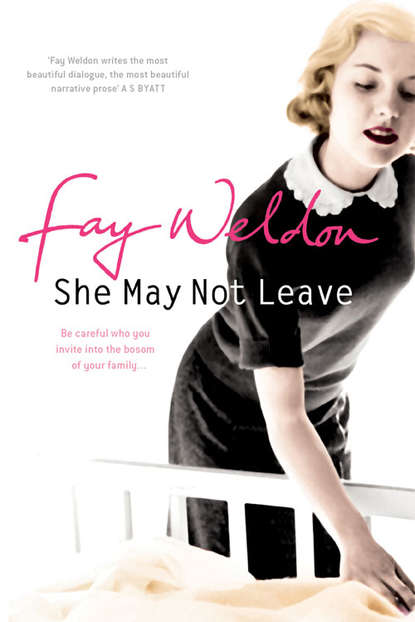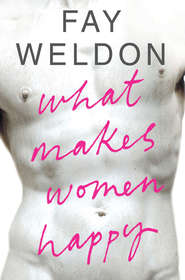По всем вопросам обращайтесь на: info@litportal.ru
(©) 2003-2024.
✖
She May Not Leave
Автор
Год написания книги
2018
Настройки чтения
Размер шрифта
Высота строк
Поля
I daresay if you add up the anxious, tearful, tormented days and nights we have had throughout life, the pair of us, they come to about the same. I clocked up a good few in my seventy-first year, when Sebastian was held incommunicado in a Dutch police cell, and later in prison, but I don’t think as many as Serena did, flailing and wailing and staring into space, when George betrayed her, turned against her, locked her out of her home, around the time of her sixtieth birthday. She married again soon enough.
Martyn On The Way Home From Work (#ulink_6cbccbb5-467f-5dfd-bac2-ca31faf6bdff)
New Century House, where Martyn works as a statistical journalist for Devolution, is newly built and well funded: it stands all glass, steel and shininess, in a block of small rather mean streets between Westminster and Petty France. It is pleasantly decorated and has effective climate control. There was a Legionnaires’ Disease scare when the building first opened – stagnant water had been circulating in the ‘veins’ of the building, its opening by the Prime Minister having been delayed for more than a year – but the source of the epidemic was quickly detected and put right and only a janitor died. A Feng Shui expert was called in to help with the foyer. As a result the entrance to Starbucks is at an angle calculated to welcome customers and revitalise takings. It seems to be working. The noise from cheerful non-smoking coffee drinkers floats up the escalators until well after ten each morning: the elevators smell of hot chocolate croissants.
Each of the seven floors has a dedicated rest room for stressed staff, with a good supply of fresh towels for showers, and for a small fee pillows are available for those who need to sleep. Research shows that nothing improves productivity like the short power-nap. Since Kitty arrived Martyn has made good use of these rooms. The baby sleeps well by day but not by night, no matter how often Hattie takes her to the breast, and it is impossible for Martyn to sleep through the wrigglings and moanings of both mother and child.
As well as serving as the offices of the sister magazines Devolution and Evolution, the building houses the headquarters of three think-tanks or public policy research institutes – the Centre for Post-Communist Economic Development, the Policy Coordination of Welfare Reform Initiative, the Institute for Social Commentary – and two quangos dealing with societal management and measurement.
There has been some talk of Martyn being seconded part-time to the Welfare Reform Initiative under the new Moving and Growing Human Resources Plan, which deals with unemployment issues, but Martyn is manoeuvering so this won’t happen. The pay is more, but Martyn sees his future in political journalism and indeed in politics itself. He is more likely to be selected as a candidate out of a journalistic background than from one more concerned with statistical research. He needs visibility.
Martyn is taking a nap in the fourth-floor sanctuary. It is a pale green room with pink features; rather hard on the eye but the colours are recognised to foster sleep. At home Hattie and he have strong, dark, powerful colours on the walls and they have painted the furniture red: Kitty’s cot is yellow to maximise her synaptic responses. Hattie scorns the New Age – crystals and horoscopes and so on – but has a belief in the power of colours to influence mood which Martyn finds endearing. His own upbringing was so practical and no-nonsense he sometimes finds himself hungry for Southern whimsicality.
Martyn is joined by his editor and immediate boss Harold Mappin, who collapses on an adjacent couch (modelled on one from a first-century Roman fresco) saying ‘they’ve junked almost the entire edition. Except for your Skinflints and Killjoys piece, which went down a treat. How can they call this living? If I don’t have a bit of shut-eye I shall kill myself. Debora’s wearing me out. God save us from younger women.’
There has been some policy change at the top: new health initiatives are proving too expensive for the Treasury: research is showing what Martyn had always suspected – that the more you asked young healthy people to look after their health the less inclined they were to do it: only the already ailing and the elderly bothered. The focus of the autumn issue is now to be devoted to good news rather than grim warnings. Also, circulation is falling – even the Government departments amongst which Devolution is read, themselves victims of spending cuts, are no longer taking the magazine.
All this Harold delivers to Martyn, who is pleased and flattered to be taken into his confidence, while arranging his pillows. More significantly still, he also says that he has changed his mind about transferring Martyn to the Welfare Reform Initiative. ‘Much too dull for a dude like you. We need you in the team. What about a positive piece on the new cholesterol research? What this country needs is good news.’
‘You mean something like Why You and the Chip Butty Can Be Friends?’ asks Martyn. He is speaking ironically but Harold just says, ‘Exactly’ and falls asleep, not waiting for further comment, arms flung above his head like a small child.
Harold is a large, noisy, hairy man in his fifties, with shrewd eyes. His staff put it about that he is autistic, or at any rate has Asperger’s: they look up the symptoms on the Internet, hoping for grounds for their belief that his communication and social interaction skills are so minimal he can be described as mad, and they can ignore him. Martyn has always got on with him perfectly well.
Martyn goes home encouraged and cheered. He walks to Trafalgar Square and takes the Barnet branch of the Northern Line from Charing Cross back to Kentish Town Station. Many a Westminster worker has taken exactly this route home to Kentish Town since the line was built, a hundred years ago. You walk a little first, both for the exercise and to save the trouble of changing at Embankment. And like so many before him he approaches home with a mixture of emotions: desire to see his family conflicting with a kind of terror that they exist at all. The waiting family is the source of all pleasure and the source of all dread. Once he was young and free: now he has obligations and must not be selfish.
If he is promoted as he can see he might well be, from editor to commissioning editor, his salary will jump by some £6,000 a year. That would mean Hattie could stay home with the baby, and they would no longer need to have an au pair. He wants his house to himself. Hattie, being flesh of his flesh, doesn’t count as another person: Kitty’s arrival had been an upset but she too now feels like an extension of himself, not a foreign body to be eased out.
Privacy had been dearly earned in his growing years – the lad Martyn would sit by himself in the cold in the outside loo and read, just to get a bit of peace – and not even reading had been private: you read the book your teachers said you should read and had to discuss it afterwards, otherwise you didn’t pass your exams and then what became of you? To the man Martyn the idea of a stranger living at close quarters, sharing his table, sharing his television, knowing his secrets, feels nightmarish. Surely the value of money lay not in the things you bought, but in the time, space and privacy it earned for you?
At home, there was at least the peace of familiarity, although currently disturbed and messy and Hattie mad and the baby crying and no food in the fridge. But this peopled privacy was what he had chosen, and what he wanted; it was his delight. His domestic happiness was like a Russian doll, securely weighted at the base. Sleepless nights, wailing baby and wranglings with Hattie about this and that, made it lean so it seemed bound to fall, but then it was certain to bounce back again.
But now Hattie has called him on his mobile, excited and pleased, to tell him the Polish girl is already installed in the spare room – his time, space and privacy has wilfully been breached, and by Hattie, who is meant to be on his side, thinking only of her self-interest. He disciplines his thoughts. He will not think like this. All will be well. No use being a loner in this sharing and caring age. He will go home, fit in with everyone, and behave.
Martyn Comes Home To Agnieszka (#ulink_823e1317-580d-59df-9090-7bbc70031aee)
Martyn is not prepared for what meets him when he opens the front door: Hattie with her wild hair in order, in a clean, ironed shirt and fresh jeans. She smiles at him as if she were happy to see him, not, as so often these days, with a complaint and an argument ready to spring to her lips. He had forgotten how pretty she is. She is wearing a bra again, so she has two separate breasts not a kind of undifferentiated flesh shelf. Her figure is back to its prebaby state. It probably has been for months but no one, least of all Hattie, has paid it much attention.
‘Kitty’s asleep in Agnieszka’s room,’ Hattie says, ‘and supper’s on the table.’
It is too, and like the old pre-Kitty days: delicatessen food, no longer boiled potatoes and cheap tough chops. Lots of spoons for sauces on the table and little jars of this and that which Hattie has lately derided as a wicked waste and empty calories. But no sign of Agnieszka, who it seems is out at her belly-dancing class.
‘A belly dancer! Our child is to be in the care of a belly dancer?’
‘Don’t be so sad and old-fashioned,’ says Hattie. ‘Belly dancing’s in, forget Pilates. Belly dancing teaches relaxation, muscular control and a healthy mobility.’
Hattie tells him that Agnieszka hopes to become a qualified tutor: even start up her own school in London. She loves dancing. She was even in the Polish Dance Company for a time, on a day-release course during their equivalent of our sixth form. She’d been chosen over hundreds of applicants.
‘I thought she was meant to be learning English over here and then going home.’ Martyn is disconcerted. Perhaps Agnieszka is a figment of Hattie’s imagination? Perhaps she’s in Hattie’s head and nowhere else? It occurs to him that Hattie’s new appearance might be a symptom of a disordered mind. The madness is not in the disorder but in the order?
But the food looks good and Hattie is still smiling and the room is tidy and napkins arranged by the plates, as his mother would do on special occasions. This is not imagination. A fairy god-mother has appeared and set everything right. Martyn’s mother never read fairy stories to her children as a matter of principle: ‘If they want to read let them do it for themselves.’
‘But what does she looks like?’ he asks. He feels that this is not a question he ought to ask, women’s looks are not up for discussion, and should not be taken into account in the work sphere, but he wants to know.
‘There’s nothing to tell.’ Hattie has to struggle for description. ‘She’s just ordinary. No busty beauty, no long-legged harpy. She looks pleasant enough. She has a flat tummy.
Mine isn’t quite back to normal yet. I might go along to classes with her.’
‘Leaving me to look after Kitty?’ He speaks lightly but already he can feel himself lonely and left behind by two women.
‘A babysitter can look after Kitty if we’re none of us here,’ she says. ‘Once I’m back to work we can afford as many babysitters as we want – or Agnieszka and I could always go on different days.’
This is Martyn’s moment to tell Hattie that he may well be getting a big hike in salary, and the financial imperative is removed from the issue, but he does not. If this is the new Hattie he wants her.
Martyn goes into the spare room to check on Kitty and finds her sleeping peacefully in a cot in the space between the single bed and the wall. Her hair has been brushed and lies snugly against her cheek. She is a fair, round-faced, well-filled-out baby. He loves her intolerably.
The spare room has been re-arranged to its advantage: the desk from the kitchen where it held nothing but out-of-date newspapers, run-out pens, elastic bands the postman left is now under the window, and a small bookshelf rigged up above it – English Language for Foreigners, Dancing Towards Self-Awareness and Child Development Studies – that one from the New Europe Press. He’d reviewed it for Devolution when he was in charge of the book pages. There’s a state-of-the-art laptop on the desk. How has she afforded that? His own is old and keeps crashing. This one obviously functions.
Kitty’s clothes, neatly folded, and all the paraphernalia that goes with infant care and has previously littered the living room, are now laid out tidily along one set of shelves. Agnieszka’s own belongings seem to be minimal: he looks in the drawers and sees a few neatly folded undergarments and thin pastel sweaters. Nothing is black, nothing is fancy. Reassured, he goes back into the living room.
‘We could go to bed,’ he says, ‘before she gets back.’
‘All right,’ Hattie says to his surprise and follows him into the bedroom, as if it were once again the world before Kitty, before pregnancy. They have the bed to themselves: the clouds in his head clear. He groans, she moans. In the next room, the baby does not wake. They hold each other tight for at least ten minutes before the real world intervenes.
Martyn wonders if he should tell Hattie about the article that Harold obviously wants: the endorsement of the chip butty – a soft white bread sandwich with fried chipped potatoes, well salted, for the filling – as a source of approved pleasure, the Government deciding its electoral advantage no longer lies in health and the self-abnegation that goes with it. He decides not to, because Hattie is hot on nutrition and will only bring up the subject of his father’s early death and the contribution paid to it by the chip butty, and he would rather she did not. They stay in bed and are asleep before Agnieszka returns.
In the unaccustomed peace of the morning, Martyn sleeps longer than anyone else in the household. He reckons he made a full eight and a quarter hours. He bounces out of bed naked and remembers he must now put on a dressing-gown before going to the bathroom. The dressing-gown is not on the floor but on a hanger, and to hand. Putting it on adds a feeling of ritual and security to the day. He shaves. The washbasin has been wiped, and the taps polished and the little knot of hair where the basin drains has been removed, so the water leaves quickly and no soap scum or detritus is left behind. The drying washing is still over the racks in the bathroom but has been shaken out and pegged not just flung over the wires.
Martyn sees Agnieszka for the first time, and understands that to call her Agnes – which he had been planning in his head, as a last defiance – would be inappropriate. She is a careful person and needs a careful name. She smiles sweetly and with a degree of humility, and says she is pleased to meet him: ‘Mr Martyn, the man of the house.’
Does he like an egg for breakfast, and if so, scrambled, fried or poached? Hattie is eating a boiled egg, the first of two, from an eggcup and not one of Kitty’s plastic rings. Kitty is in her high chair, well surrounded by pillows for safety. She is trying to manage a spoon and beams at her father, her mother and Agnieszka with equal pleasure. But Martyn and Hattie are new to babies: this amiability is symptomatic of the seven-month child. Soon she will become more particular and shield her face to any other than the favoured few, and weep if presented with anything unfamiliar.
Hattie and Martyn believe they are raising an extraordinarily and peculiarly talented child, of course they do: really all they are doing is raising just another human being, but one who is going to shove them back into the past a whole generation. Already they are not the ones coming in but the ones going out.
To Kitty, hard-wired to charm and annoy in equal measure the better to thrive, her parents are the means of her survival, bit-part players in her life, grand-parent fodder for the children she will have, if everything goes right. But she does love them. She loves what is familiar and those who do her bidding.
Au Pairs We Have Known (#ulink_ec94dccd-e885-5b33-ad33-a8913526157c)
The first of the au pairs came to us in the winter of 1963. Her name was Roseanna. In those days I, Frances, and Serena pooled our child-care resources. If my children, Lallie and Jamie, were more often in the Caldicott Square house than hers, Oliver and Christopher, were in mine, it was because that was what the cousins chose. Her house was bigger, though mine was warmer.
My house was tall and the staircase wide, only one room on each of the four storeys, and a bathroom squashed beneath the roof. Serena’s and George’s house was one of those late-Georgian pillared double-fronted affairs, not detached, but presenting a unified face around the Square. In those days they were dilapidated and unheated. The basements were damp because the Fleet River ran underground. My peculiar house, known as The Tower, had a curved brick façade, and was squashed in between the regular-looking buildings. Some speculative builder had miscalculated his measurements back in the 1820s, and a later one filled an unproductive gap.
Serena and George owned their house. I rented, and Serena often had to help me with the monthly payments. I sometimes resented the fact that she saw me as some kind of extension of herself, and that what was hers by right was mine as well, but at least she never seemed to expect me to be grateful. Nor did George have to be consulted: Serena earned her own money.
Вы ознакомились с фрагментом книги.
Приобретайте полный текст книги у нашего партнера:
Приобретайте полный текст книги у нашего партнера:











